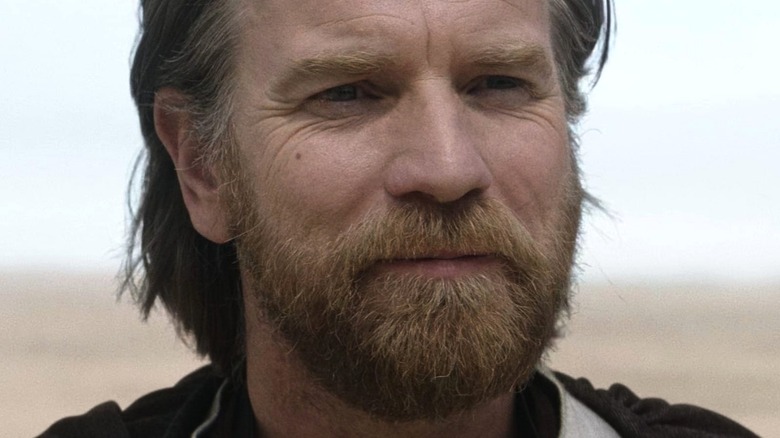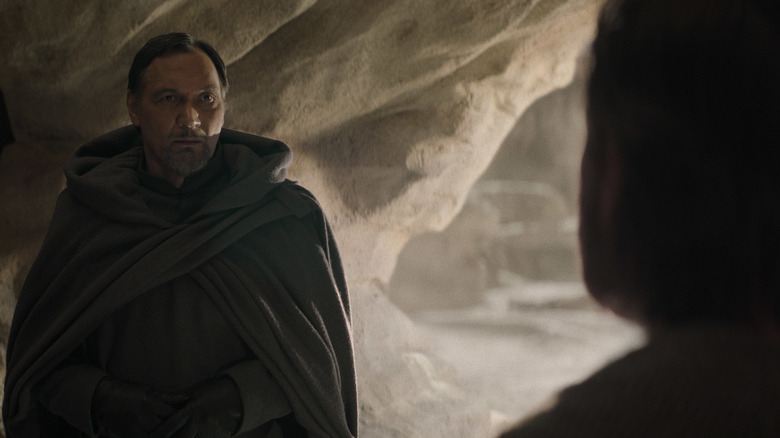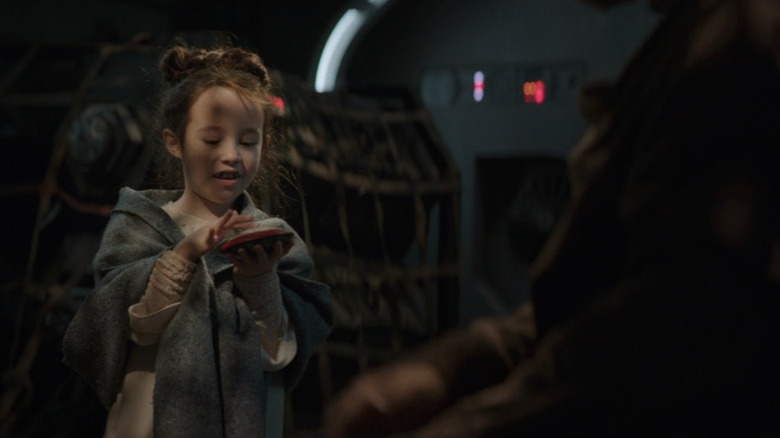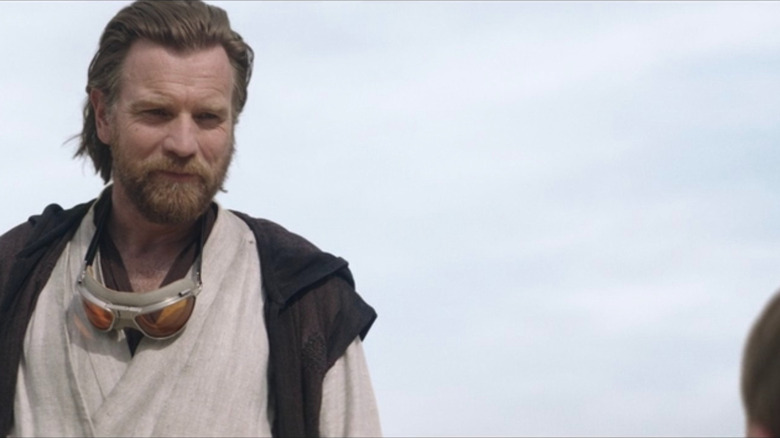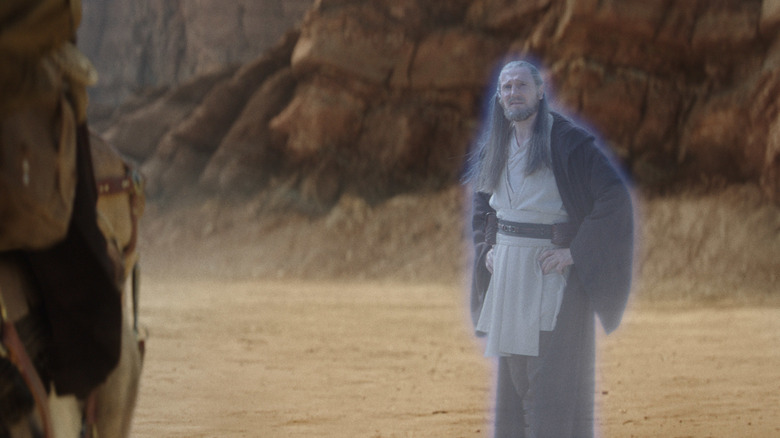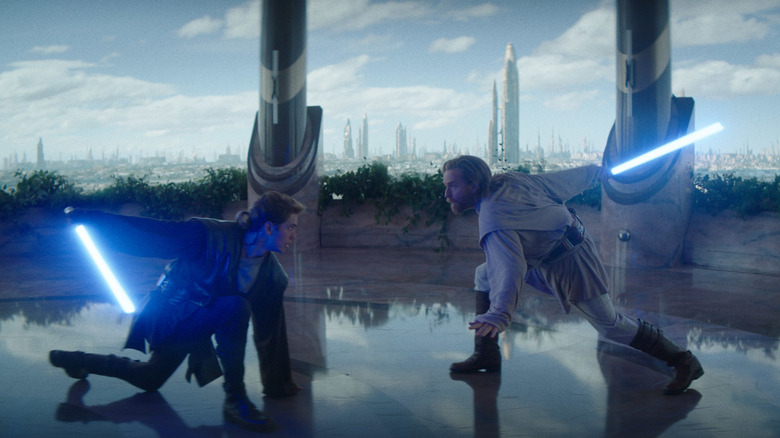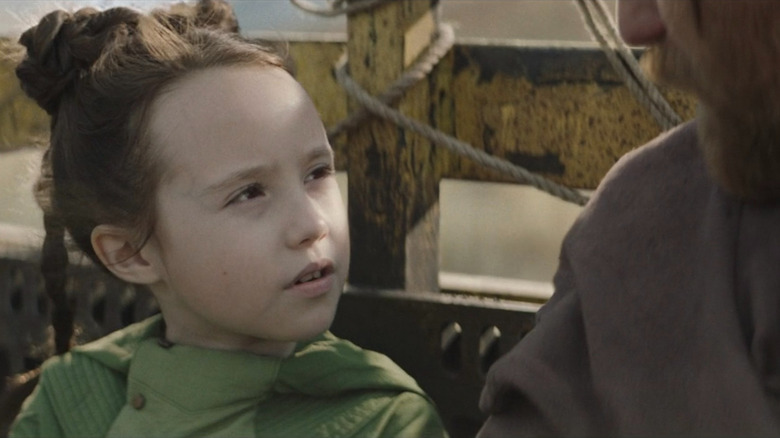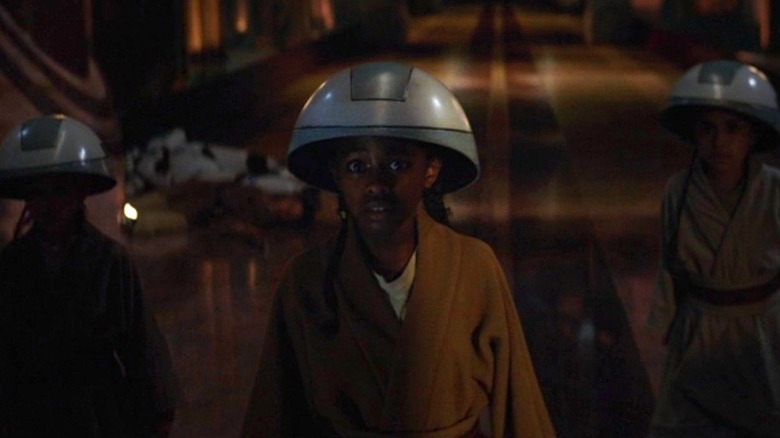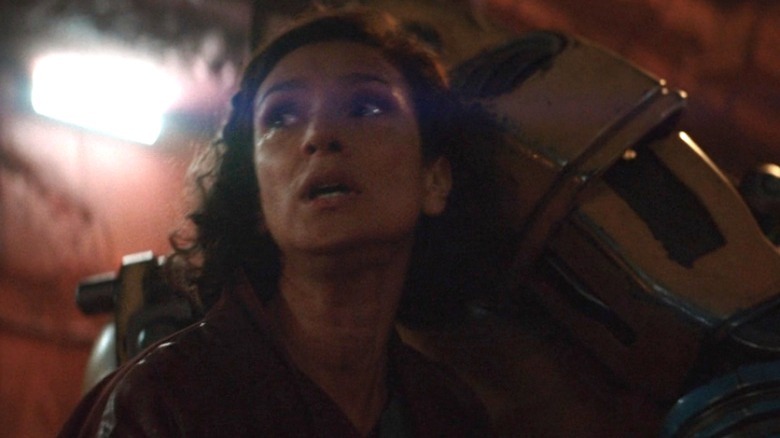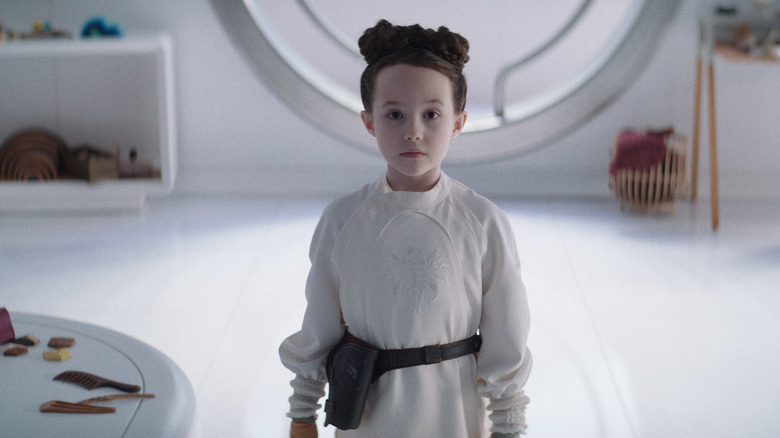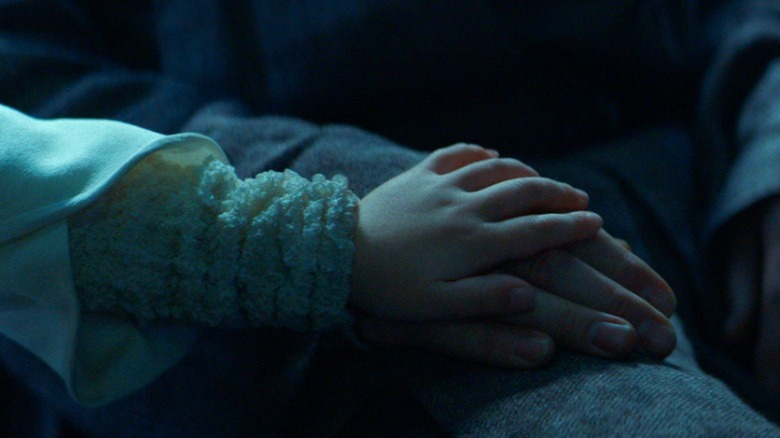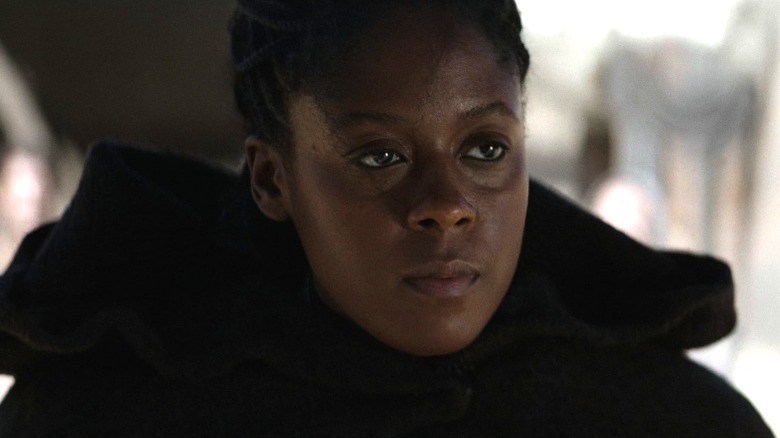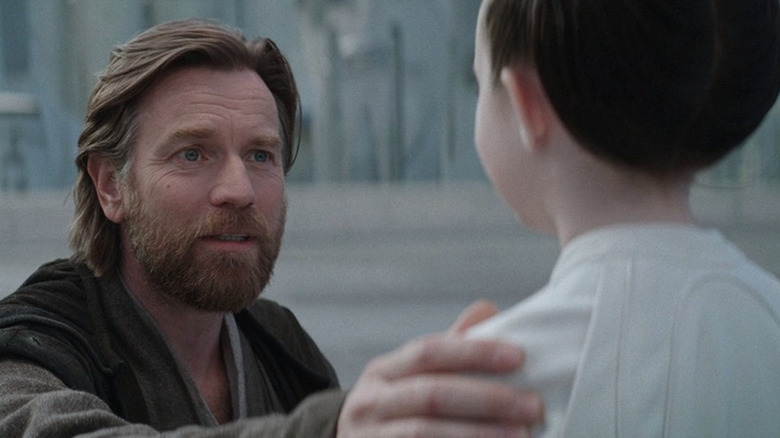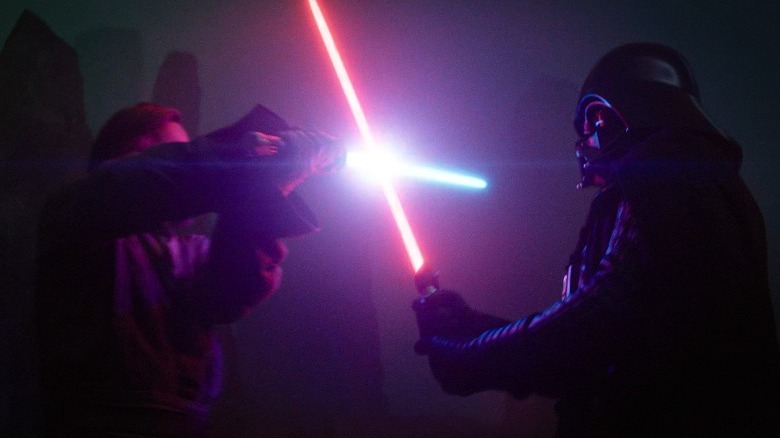Obi-Wan Kenobi's Most Emotional Moments Ranked
"Obi-Wan Kenobi," doesn't miss a beat in sticking one gut-punching emotional landing after another. Set 10 years after the ending of "Star Wars: Revenge of the Sith," the series starts by following Ewan McGregor's Obi-Wan Kenobi in a mundane routine of working at a meat packaging facility in Tatooine, passing his days by watching over Luke Skywalker from afar. In its entirety, the series carefully examines the heartaches and guilt that grief leaves behind while simultaneously digging into what it means to give oneself to a cause.
"Obi-Wan Kenobi" also fixes the questionable details within Star Wars lore by adding layers to most of the key players in the franchise like Luke, Leia, and even Darth Vader. As a series full of quiet moments intermingling with fierce lightsaber battles and explosions, director Deborah Chow places the absence of hope at the center by allowing the characters to take complete control of the story while highlighting little moments that equate to something bigger. While there are indeed plot holes, the emotional draw stems from the performances, showcasing what it truly means to remember the past while gearing up for a new purpose.
13. Bail Organa visits Obi-Wan
The 1st Episode subtly stings as we watch Obi-Wan, now Ben, entirely alone, suffering from nightmares and memories. At the same time, Owen (Joel Edgerton) calls him out for failing to train Anakin properly. Showing the audience his monotonous routines accentuates the loss of a real purpose, but much of the emotional beats come from McGregor's performance which shows the colossal self-doubt Obi-Wan lives with.
That's why when Bail Organa (Jimmy Smits) visits him after sending the message about Leia's kidnapping, we get the first verbal admittance that much of Obi-Wan's past still weighs heavily on him. "I'm not the man you remember," Obi-Wan somberly admits, prompting Bail to emphasize that he's going to have to remember because he cannot trust anyone else with his daughter's safety. There's also the matter of Bail making it clear during their initial conversation that Leia is just as important as Luke, which hints at the leadership role the princess assumes in later films.
12. Leia leaves Lola with Obi-Wan
The emotional presence of droids in Star Wars is one of its more appealing aspects. When Obi-Wan fixes Lola after learning about Anakin's survival, it is a coping mechanism that reminds viewers of who Obi-Wan used to be. He's a resourceful man whose inability to watch others struggle remains one of his most significant characteristics. There's also the matter of how this scene shows us the type of future these characters could have had if circumstances were different. After all, Obi-Wan could have been an uncle-like figure to the twins.
In the season finale, after Obi-Wan sees how Leia uses Lola to distract frightened passengers, he serenely remarks that maybe he should borrow her too. Later that day, Leia sneaks Lola into Obi-Wan's pocket while saying goodbye, knowing he could use the support as he goes into battle one more time. Whether it's her way of assuring that he'd keep his promise and come back or the benevolent choice to do something to help Obi-Wan out, Leia's gesture is as sweet as it is emotional.
Throughout the show, Lola is Leia's closest confidant, apart from her family. Lola is a droid Leia could rely on, and she knows it well enough to understand when it's acting up. Thus, putting aside her own need for Lola and giving her to Obi-Wan is not only a showcase of her selflessness but also proof of how much she trusts and cares for him too.
11. Obi-Wan formally meets Luke
As Obi-Wan packs up his cave, heading towards a new home, he visits the Lars' residence to inform Owen that he understands the importance of Luke needing to be a kid for now. He asks him to take care of the boy. prompting what's Owen to ask if Ben would like to meet Luke formally. With the toy starship in hand that we later see in the first film, Obi-Wan utters the words fans everywhere were waiting for.
For the kids who grew up in the prequel era, no matter the criticism surrounding them, there's always been something about Obi-Wan Kenobi's "hello there" that many of us hold onto. T-shirts, mugs, memorabilia of all sorts — two words, but all Star Wars fans immediately get it. Sir Alec Guinness says it first in "A New Hope," and McGregor calls back to it in "Revenge of the Sith," but there's a nostalgia to the version we get in Episode 6 that's almost indescribable.
Thanks to this moment, viewers can see that some semblance of contentment is now present in Obi-Wan's life. Where it is hard to imagine that anything could make him smile, let alone bring back parts of the person he used to be, this moment showcases the glimmers of the notable Jedi who becomes the Republic's "only hope."
10. Qui-Gon finally appears to Obi-Wan
One of the most heartbreaking parts throughout the season is Obi-Wan trying and continuously failing to communicate with his former master Qui-Gon Jinn (Liam Neeson). Ewan McGregor brilliantly manages to make Ben look and feel so small every time he calls out to Qui-Gon. Whether it's in the 1st Episode after his nightmares or in the 3rd after learning that Anakin is alive, the aching desperation that McGregor laces his voice with consistently feels like a punch in the guts.
When his former master's Force ghost finally appears and he states he's always been there, it is a poignant reminder that Obi-Wan's pain hinders much of his ability to see clearly. Qui-Gon blatantly says that Obi-Wan wasn't ready to see him yet, which further clarifies how lost he was and how much he needed saving. The series' decision to overtly place despondency front and center also touches on Yoda telling Obi-Wan that "only pain will follow" before he watches Anakin kill younglings. Beyond that, considering it's been 22 years since the last time fans saw Neeson's character, his comforting presence almost hits viewers as hard as it does Obi-Wan.
9. Anakin and Obi-Wan sparring memories
Much like Obi-Wan uttering the words "hello there" or seeing Qui-Gon reappear, the nostalgia tied to watching Ewan McGregor and Hayden Christensen play their "Star Wars: Attack of the Clones" counterparts hits like a ton of bricks. Beeyond that, the emotional beats in this scene remind us of how much was lost after Anakin turns to the dark side, along with the detail that though he is primarily a machine now, as these are some of Vader's memories. McGregor and Christensen escape so easily into their younger selves as they spar in a duel that exhibits Anakin's need to show off — along with Obi-Wan's tactfulness.
Yet, even Anakin's simple smile can be heartbreaking when examining the friendship the two would later fortify during events depicted in "Star Wars: The Clone Wars." There's also something about this scene that richly showcases the essence of Mike Chen's "Brotherhood" — a novel that brilliantly lays out the relationship between the two Jedis and shows how much they mean to each other.
8. Leia asks Obi-Wan if he's her real father
Bail Organa is the most incredible father a kid can ask for, but children are inherently curious. Leia's question at this moment is almost as gut-wrenching as the truth behind Obi-Wan's words when he looks at Leia and sees her mother's face. After all, Obi-Wan cared about Padmé just as much as he did about Anakin. And there's no denying that in the same way that he feels he failed Anakin, he believes he failed Padmé, too. Therefore, these words are as truthful as it comes.
More than anything, when Obi-Wan states that he wishes he could say he was her father, it directly ties to the heartache that he hasn't had the chance to grieve Padmé's death either. It also showcases that Obi-Wan knows how to talk to and comfort children, which makes Owen's hesitancies towards him that much sadder.
7. Flashbacks to Order 66
Order 66 flashbacks in any form are almost too heartbreaking to even discuss, especially given the events that we know resulted from the command. Still, they're a critical part of this story, and thus, the series needed to emphasize the ramifications of Anakin's decisions, not once but a few times, primarily where it serves Reva's arc in the 5th Episode.
As one of the key moments that ultimately reveal how Anakin is too far gone, Reva's involvement brings her character motives to the center stage. As many fans predicted, Reva was the sole survivor of the attacks, losing the only family she knew and loved. In the aftermath of her grief and the guilt she lived with, we learn that she isn't serving Vader — she's hunting him. Reva wants him dead, and a large part of her rage toward Obi-Wan is because he wasn't there to help them. In a powerfully heart-wrenching scene, she asks, "Where were you?" It's a moment that Moses Ingram packs with such visceral pain that it's impossible not to feel every ounce of the pain Reva feels.
6. Tala's death
Indira Varma's Tala Durith is a standout character whose death results in one of the most heartbreaking moments in the series. When she first joins the story, she's an Imperial officer working as a double agent to help Jedi escape through the Path. In the 5th episode, before Tala dies, we learn that when Tala first joined the Galactic Empire, she genuinely believed she was doing the right thing until she watched the slaughter of 14 people, children included. She vowed then and there that she'd do everything to fight for better days.
Tala's compassion, understanding, and resilience are a beacon of hope in the series, making her death that much more tragic for everyone who knew her. When Tala chooses to do the right thing one more time by using the explosive to ensure Ben and the others are safe, she and NED-B pay the ultimate price.
5. Leia wears Tala's holster
Leia isn't present when Tala sacrifices herself, but after Roken (O'Shea Jackson Jr.) finds her holster, he and Obi-Wan decide Leia should have it. "It's what she would've wanted," Obi-Wan tells her. This scene results in a surprisingly comic moment where Leia states that the holster is empty, prompting Obi-Wan subtly roll his eyes before responding with, "I wasn't going to give you a blaster, Leia. You're ten years old." However, it's the moment when Leia puts the holster on after she's safe on Alderaan that symbolizes the profound impact that Tala has had on Leia.
Leia's capture and everything she goes through during that experience show her that the Empire isn't helping. Rather, it is a central part of the problem. This revelation undoubtedly inspires her to eventually become a part of the Rebel Alliance. Tala's sacrifices lead to the kind of resistance built on hope and bravery that Leia Organa sprinkles everywhere she goes. Leia observed Tala's bravery and her decision to fight for something bigger than herself — despite the danger it put her in.
Thanks to this and everything we know about General Leia Organa from the sequel trilogy, it's emotionally compelling to have a visual representation of the fact that Tala's legacy is something Leia carries with her.
4. Leia comforts Obi-Wan
In "A New Hope," when Obi-Wan dies, viewers see Leia Organa comforting Luke Skywalker. She's an unceasing source of warmth for everyone in the sequel trilogy as well, greeting both old and new friends with an embrace or a warm smile to assure them they aren't alone. Knowing this about her makes little Leia's decision to hold onto Obi-Wan's hand after Wade's death that much more emotional. The purity in her heartwarming gesture shows us that though she is young, she understands when people are in need.
As we watch her tiny hand reach for Obi-Wan's and see him return the gesture, it makes for a moment that's not only profoundly wholesome but incredibly telling. For most of his life, especially with what we've seen in the canon universe, Obi-Wan Kenobi doesn't stop to slow down when the world around him crashes and burns. He doesn't grieve properly or truly overcome the pain. Instead, he pushes it all down, keeping himself busy. He had no comfort when Qui-Gon Jinn died in his arms, no moment of condolence after Satine's death in "Star Wars: The Clone Wars," the tragedies on Mustafar, or even following Padmé's death.
The series ultimately confirms how alone he's been through every loss and heartache. That's why Leia's sincere gesture leaves a mark — because it's a sign to him that, for a moment, he isn't alone. In the same way, by holding her hand, he shows Leia that wherever she is she has someone who'll always come to her rescue.
3. Reva's breakdown
After Vader and the Grand Inquisitor (Rupert Friend) leave her to die, Reva notices Bail's message and sets out for Tatooine to find Luke. After she glimpses him lying on the floor, Reva remembers the massacres of Order 66 once more and ultimately sees a version of herself in the child. She chooses to bring Luke safely back home. In a later conversation with Obi-Wan, she asks if she's like Vader.
Obi-Wan tells Reva that she's free now to become whoever she'd like to be. With tearful understanding, Reva tosses her lightsaber in the sand and rises with Obi-Wan. Moses Ingram's performance throughout the series is an undeniable highlight that serves both the plot and the character. She shows viewers her pain with such subtlety in the beginning that when she finally has this cathartic breakdown in the sands of Tatooine, it feels much more evocative. Vengeance does wonders for the will to survive, but so does love, and in the end, Reva chooses to move forward by honoring those she cares about in a better way.
2. Obi-Wan tells Leia about her parents
Whether it's William Ross' "Saying Goodbye" mixed with John Williams' "Leia Theme" or the heartwarming performances, Obi-Wan and Leia's parting results in one of the most beautiful scenes in the show. After sharing a laugh and returning her droid, Obi-Wan decides to be transparent with Leia, telling her that he did, in fact, know her parents. He then crouches down and tells her that she is wise, discerning, and kindhearted like her mother, followed by the details that she is passionate, fearless, and forthright like her father. Vivien Lyra Blair holds her own incredibly alongside Ewan McGregor throughout the entire series, but there's something profoundly admirable about her quiet performance at this moment.
He also states that he wishes he could tell her more, but Leia, looking towards Bail and Breha (Simone Kessell), reassures him that it's okay. She asks if she'll ever see him again, to which Obi-Wan replies, "Maybe. Someday. If you ever need help from a tired, old man."
These words and the trust the two establish during their time together add colossal depth and heart to Leia's memorable distress call, as well as a touch of sorrow when we realize that the next time she sees him years later, he gives his life for her survival. This is maybe the most important moment in the entire show, as it brings significant heart to the events of "Star Wars: A New Hope," confirming why Obi-Wan Kenobi is the essential beacon of hope. In addition, Obi-Wan's unwavering kindness allows us to fully understand Leia Organa's poignant decision to name her son Ben.
1. Obi-Wan says goodbye to Anakin
Obi-Wan learning that Anakin is still alive is one thing, fighting him and losing is another, while the final battle is something else entirely. In a lightsaber duel that would've been a astonishing to see on the big screen, the Jedi Master and his former Padawan face off one more, brothers no longer, leading to a parting that truly marks the end of all that they've known. After Obi-Wan is crushed underneath boulders he rises from the depths and manages to break Vader's helmet. He then apologizes after looking into the eyes of his friend.
In what results in a brilliant sound-mixing tactic where Christensen's voice is blended with James Earl Jones', Vader says, "I'm not your failure, Obi-Wan. You didn't kill Anakin Skywalker. I did." The camera pans to McGregor's grief-stricken expression, which reveals that he finally understands that his brother is beyond saving. He says goodbye, calling him Darth instead of Anakin.
It might be the small amount of good left in Anakin — the parts Padmé died believing in — is the part of him who carefully chooses these words as a way of absolving Obi-Wan of his guilt. Still, Obi-Wan loses his best friend for good on these grounds, marking the end of the brotherhood he would've done anything to protect. Hopefully, he understands that he should no longer torment himself over the choices Darth Vader makes.
